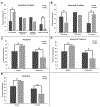Insomnia Treatment Preferences Among Primary Care Patients
- PMID: 35361532
- PMCID: PMC9133067
- DOI: 10.1016/j.clinthera.2022.03.002
Insomnia Treatment Preferences Among Primary Care Patients
Abstract
Purpose: Sleep disturbance is common in primary care. The main treatment options include medication and cognitive behavioral therapy for insomnia. Best practice guidelines recommend a collaborative decision-making approach to treatment. This study examined differences in insomnia treatment preferences based on demographic and clinical characteristics among primary care patients.
Methods: A total of 200 patients (mean [SD] age, 54.92 [12.48] years) at a university medical center and community health clinic participated in brief screenings for insomnia, depression, anxiety, and insomnia treatment preference. Insomnia symptoms were measured with the Insomnia Severity Index, whereas depressive and anxiety symptoms were measured with the Patient Health Questionnaire 2 and Generalized Anxiety Disorder 2. χ2 analyses were performed to detect significant differences in preference between groups.
Findings: A total of 46.5% of participants preferred medication and 56.0% preferred behavioral treatment (ratings not exclusionary). Preference for behavioral treatment was highest among severe insomnia presentations (15.2% preferred to 4.5% disliked; P = 0.002). Medication preference was higher among patients with elevated anxiety (57.3% preferred to 42.7% disliked; P = 0.017). Preference for behavioral treatment (66.7% preferred to 33.3% disliked; P = 0.012) and medication (56.8% preferred to 43.2% disliked; P = 0.016) was highest among those with elevated depression. Treatment preference only differed by age for behavioral treatment (P = 0.008). Preference was highest among patients ≤51 years of age (67.2% preferred to 32.8% disliked).
Implications: Primary care patients preferred behavioral and medication strategies for insomnia treatment. In addition, as mental health and sleep worsen, patients were more likely to prefer behavioral treatment. Knowledge of patient treatment preference may facilitate shared decision making, which increases patient satisfaction with care and engagement with treatment.
Keywords: behavioral treatment; insomnia; medication; primary care; treatment preference.
Copyright © 2022 Elsevier Inc. All rights reserved.
Conflict of interest statement
Declarations of interest statement: Joseph Dzierzewski served on an advisory panel for Eisai Pharmaceuticals and received an honorarium for a presentation given for the Nevada Psychological Association. All other co-authors have no interests to disclose.
Figures
References
-
- American Psychiatric Association. Diagnostic and Statistical Manual of Mental Disorders. 5th ed. American Psychiatric Publishing; 2013.
-
- Shochat T, Umphress J, Israel AG, Ancoli-Israel S. Insomnia in primary care patients. Sleep. 1999;22 Suppl 2:S359–365. - PubMed
Publication types
MeSH terms
Grants and funding
LinkOut - more resources
Full Text Sources
Medical


